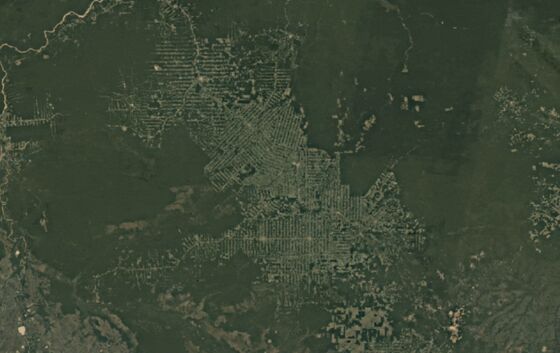The Amazon Rain Forest Burns Again
Torrential rain has been the only thing slowing down the ruin.

(Bloomberg) -- The election of Jair Bolsonaro, a regulation-hating populist with a big following in Brazil’s farm country, was supposed to trigger a surge in deforestation of the Amazon. Five months into his presidency, there are essentially no signs of any such pickup. If anything, the numbers are down.
But conservationists are deeply concerned. Not only do they see the lull in cutting and burning under Bolsonaro as an aberration — due to unusually heavy rainfall — they point to something alarming that has escaped notice across much of the world: Deforestation has been on the rise for years.
It soared 73 percent in the Brazilian Amazon between 2012 and 2018, reversing a successful push to curb logging by ranchers and farmers over a nearly decade-long period. Last season alone, almost 2 million acres, an area bigger than Shanghai, were cleared from the world’s largest rain forest, government data show.
There are many reasons for the surge — from the amnestying of farmers who illegally razed jungle, to a law that made it easier for them to gain legal title to land they had claimed unlawfully, to a reduction in environmental inspections in the region.

“All those measures helped fuel a perception of impunity,” said Paulo Barreto, a researcher at a nonprofit called Imazon. “That’s the picture we’ve seen even before Bolsonaro.”
The president plans to open up more of the Amazon, having laid out initiatives to loosen restrictions on farming and mining activities in protected areas. For environmentalists watching global warming accelerate, this all spells disaster.
The 2 million-square-mile rain forest is a major repository of carbon dioxide, playing an essential role in the fight against climate change. It’s also home to 10% of all known plant and animal species. And over the past four decades, the jungle has lost about 18% of its territory, according to Greenpeace.
But as Bolsonaro’s top security adviser, General Augusto Heleno Pereira, made clear in an interview this month, the government has little interest in listening to outsiders’ concerns. “I don’t accept this idea that the Amazon is world heritage,” Heleno Pereira said. “This is nonsense. The Amazon is Brazilian.”
The president has repeatedly expressed a desire to develop the Amazon, home to 20 million Brazilians, railing against environmental organizations and regulators that he has complained act as “an industry of fines.’’
Flavio Bolsonaro, the president’s oldest son and a senator, introduced a bill last month to revoke the so-called legal reserve requirements, which designate a minimum percentage of property — ranging from 20% to 80% — that farmers must preserve as natural vegetation. The measure would free up over 412 million acres, an area larger than Iran, for agricultural and mining activities, according to Gerd Sparovek, a professor at the University of Sao Paulo’s College of Agriculture.

“It’s a necessity to further occupy the Amazon region and exploit its natural resources,” according to a statement from Flavio Bolsonaro and another senator, Marcio Bittar, backing the proposal.
Brazil has been a victim of a “radical, fundamentalist and irrational” environmental movement, they said. “There’s no sense in the ecological clamor manufactured by Europeans, North Americans and Canadians and imposed on the country and its rural producers.”
Despite the Bolsonaro administration’s attitude, Amazon deforestation fell in the first four months of 2019 by 40 percent from a year earlier, according to data from Imazon. Conservationists said the heavy rains early in the year prevented ranchers from burning and clearing with their usual fervor.
While the expansion of soybeans and other crops have played a role, most of the jungle devastation is driven by cattle ranching, Imazon’s Barreto said. While meatpacking companies including top producer JBS SA have agreed not to buy from newly deforested areas, the effectiveness of the ban has been limited, Barreto said.
Adding to the pressure is booming demand for beef from China, where rapid growth over the past decade created an expanding middle class that can afford the protein. Shipments to China, already the main export destination for Brazilian meat, are set to increase in the next few years as a swine fever outbreak slashes hog supplies in the world’s largest pork producer and consumer.

Also, Brazil is expanding its infrastructure into the Amazon region. That includes a new northern export route that drastically reduced the distance from arable land in remote areas of Mato Grosso and Para states to sea ports, making them more attractive for soybean and corn cultivation. U.S. agribusiness giants are involved in a plan for the construction of a railroad to boost the route’s capacity.
The efforts to check the ruin of the rain forest from 2004 through 2012 were deemed a success, slashing deforestation rates by four-fifths. The credit went to tougher sanctions on forest destroyers, a major expansion in protected areas and a moratorium by trade houses including Cargill Inc. and Bunge Ltd. on purchases of soybeans from newly deforested land.
After the pause at the start of the year, preliminary data from May suggests it has picked up pace in protected Amazon areas as the rains let up, according to the alert system of Brazil’s National Institute for Space Research, known as Inpe.
“It’s impossible to anticipate anything, but May data is flashing a yellow sign,” said Claudio Almeida, who coordinates Amazon monitoring at Inpe. The months of June, July and August, when weather is usually drier and deforestation rates peak, “will be crucial.”
To contact the editor responsible for this story: David Papadopoulos at papadopoulos@bloomberg.net, Anne Reifenberg
©2019 Bloomberg L.P.